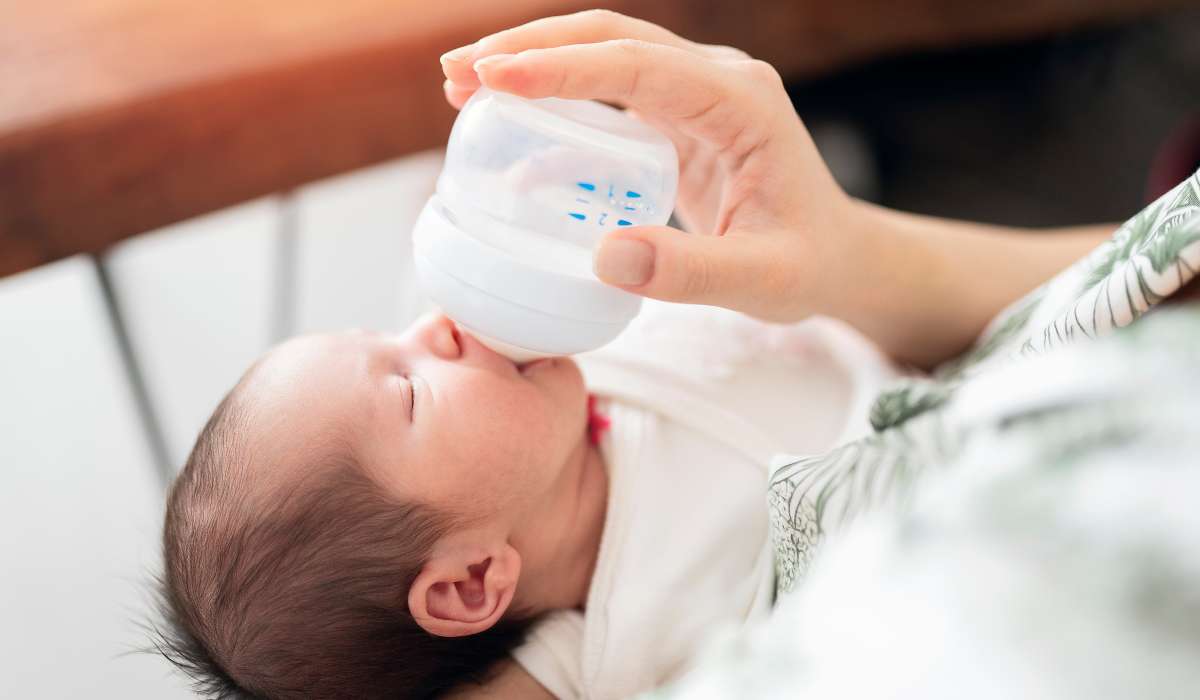For parents who choose to formula feed, you shouldn't have to compromise on nutrition. Thankfully, there are plenty of infant formula brands dedicated to offering the best ingredients and all-important nutrients to your little one. One popular choice among parents seeking out the cleanest formula for their babies is HiPP! This German brand is known for its commitment to safety, innovation, and of course, top-quality organic ingredients.
Today's guide will take you through various HiPP formula ingredients to help you understand what it has to offer. So to all the nutrition nerds out there, get ready as we explore the best formula ingredients from HiPP!
Detailed Overview of Ingredients in HiPP Formula
For those of you who are less familiar with infant formula products, here's a quick rundown of what you'll find in a healthy formula: A base of milk, most often cow's milk but goat's milk is increasingly popular as well, organic lactose, vegetable oils and a nourishing blend of vitamins and minerals. European formulas are also required to include the essential fatty acid, DHA, which HiPP sources from fish oil. However, HiPP formulas also include the fatty acid ARA for balanced nutrition.
Organic Lactose and Organic Skim Milk for Protein and Carbohydrates
Cow's milk is the main protein source in HiPP infant formula. Protein is essential for babies, as it helps their brain, muscles, and other tissues develop and grow. This growth period is especially critical during the first twelve months of life.
To provide the best possible nourishment for your baby (after breast milk, of course), HiPP offers a gentle protein composition designed to mimic natural human milk. The thing is, plain cow's milk contains 80% casein and 20% whey milk proteins.
Early-stage breast milk, on the other hand, contains 40% casein and 60% whey. Since casein can be difficult for babies to digest, HiPP adjusts the casein-to-whey ratio in their HiPP Stage 1 formula for newborns to ensure their formula is as close to breast milk as possible.
Lactose is a carbohydrate in HiPP infant milk formula that serves as energy for your baby and offers various benefits:
-
Lactose helps the digestive tract absorb nutrients better.
-
Lactose occurs naturally in breast milk and is a key ingredient in HiPP formula powder.
-
European regulations require at least 30% of carbs in baby formula to come from lactose.
Importantly, HiPP organic milk is offered in a variety of country versions, and some later-stage formulas may include starch or maltodextrin. However, HiPP Dutch and UK formulas are lactose-only so when buying HiPP UK or HiPP Dutch Stage 1 and up, you will only find lactose as a carbohydrate. And thankfully, no matter which HiPP formula you go for, none of them will contain added sugars like corn syrup.
Vegetable Oils for Healthy Fats
To make sure its infant formulas have a fat profile similar to breast milk, HiPP uses a combination of organic vegetable oils to deliver essential nutrients to your baby.
HiPP uses a carefully selected blend of...
-
Organic palm oil
-
Organic sunflower oil
-
Organic rapeseed oil
While palm oil may raise concerns among parents, it's important to remember that HiPP only sources vegetable oils through sustainable cultivation. This brand is dedicated to safety and quality in each step of production.
Essential Vitamins and Minerals
No formula can support your baby's growth without vitamins. That's why HiPP baby formulas contain folic acid, pantothenic acid, vitamin D, vitamin C, vitamin A, vitamin K, and vitamin E among other ingredients. Let's look at a few examples of what these vitamins do:
-
Vitamin D is necessary for effective calcium absorption and bone health.
-
Vitamin C is an antioxidant that helps strengthen your baby's immune system.
-
Vitamin A is crucial for normal eye development and healthy vision.
And, of course, the harmonious teamwork of vitamins as well as minerals like magnesium sulfate, sodium citrate, iron sulfate, calcium chloride, and zinc sulfate in prepared formula helps fuel their healthy development. Let's look at a couple of examples of what these minerals do:
-
Iron sulfate is necessary for hemoglobin production and neurological development
-
Calcium carbonate is crucial for healthy bone and teeth formation and aids regular heartbeat and transmission of nerve impulses
Fatty Acids for Brain and Eye Development
HiPP infant formula wouldn't be complete without fatty acids ARA & DHA, also known as docosahexaenoic acid and arachidonic acid. Derived from mortierella alpina oil and fish oil, they offer multiple health benefits. DHA and ARA serve to support your baby's cognitive function, eye development, and immune system health!
Additional Nutrients in HiPP Organic Baby Formula
HiPP Bio Combiotic formulas boast the addition of probiotics and prebiotics. Prebiotics are special dietary fibres that feed healthy bacteria in your baby's gut microbiome which is the foundation of healthy digestion.
Probiotics are actually friendly microorganisms that can help fight harmful pathogens and support digestion, gut health, and immune function. Thus, because HiPP formulas are enriched with prebiotics and probiotics, they can be a great option for babies with digestive issues. What's even more amazing is that HiPP probiotics are lactic acid culture originally taken from real human milk!
And it doesn't end there. HiPP goes the extra mile and also adds L-tryptophan to its baby formulas. This essential amino acid is crucial when it comes to brain development, sleep and wake rhythms, and neurobehavioral regulations of food intake. L-tryptophan also helps the brain metabolize melatonin (the "sleep hormone" and serotonin the "happiness hormone".
HiPP German Formula Ingredients
HiPP German formulas based on cow's milk are a unique product that combines organic skim milk, vegetable oils, lactose, vitamins, minerals, and essential fatty acids. HiPP German is an organic and non-GMO formula certified by the EU that also holds the more stringent HiPP organic seal.
And it gets better: this HiPP infant milk formula features a distinctive combination of ingredients that make it very similar to human milk. It is lactose-based, enriched with prebiotics and probiotics, ARA and DHA. All of these components can be found in breast milk.
A quick note: some stages of this baby formula contain starch or maltodextrin (stages 1, 2, and 3). This ingredient is added to improve texture and as an extra source of energy for your little one. However, Stages PRE, Stage 2 no-starch and stages 1+ and 2+ do not contain starch or maltodextrin.
HiPP Dutch Formula Ingredients
HiPP Dutch Combiotic is another example of a baby formula that uses the highest quality organic ingredients. Unlike HiPP German, all stages from HiPP Dutch Stage 1 and beyond are lactose-only. However, they share the similarity of being enriched with probiotics, essential fatty acids, and vitamins.
HiPP Dutch formula powder includes prebiotics called oligosaccharides which work to support your baby's healthy intestinal flora and immunity. Now, while the ingredient list is pretty similar between HiPP German and Dutch, some parents prefer the latter due to its larger, more durable tin cans compared to HiPP German's cardboard boxes. Moreover, those seeking a lactose-only formula would prefer HiPP Dutch.
Ingredients in Specialized HiPP Formulas
If your baby has particular nutritional needs, they might require specialized formula. Luckily, HiPP has several to choose from. Keep in mind that these formulas are not organic because they use special ingredients that aren't able to qualify for organic status, such as hydrolyzed milk in HiPP Comfort for example. That being said, these baby formulas by HiPP are still proudly safe and GMO-free! Let's take a close look at these special formulas from HiPP now!
HiPP Comfort Formula
Looking for infant milk formula that can meet all your baby's nutritional needs while catering to their digestive problems? Then HiPP Comfort might be the right solution. This baby formula uses gentle ingredients suited for infants with sensitive tummies and specifically caters to babies with excessive flatulence, lactose-related 3-month colic and constipation.
-
It has reduced lactose levels, which is an ingredient some babies can have difficulty digesting
-
It contains extensively hydrolyzed milk proteins, which are essentially just smaller milk particles that your baby's tummy can digest more easily.
-
It is enriched with prebiotics and probiotics that can give a boost to your baby's digestive system.
However, it's worth mentioning that because HiPP Comfort contains reduced lactose levels, those missing carbs are replaced with maltodextrin, a common lactose substitute in gentle formulas.
HiPP Hypoallergenic Formula
HiPP HA contains extensively hydrolyzed milk proteins that help reduce the allergenicity of cow's milk. While not suited for babies with cow's milk protein allergy (CMPA) or lactose intolerance, it can be a great solution for cow's milk sensitivities.
Another great ingredient in this baby formula is natural probiotic lactic acid cultures combined with prebiotics. Together these ingredients help strengthen your baby’s intestinal walls, protecting their digestive system from harmful bacteria and allergens. Thanks to this, HiPP HA formula can help your little one's digestive system work more smoothly.
HiPP Anti Reflux Formula
Reflux is a common issue in young babies, and HiPP Anti-Reflux has the perfect ingredients to help manage that. First off, it contains lactose only and doesn't turn to starch or maltodextrin as a thickening agent. Instead, HiPP Anti-Reflux uses carob fruit to make the formula denser. Such a thick consistency can help your baby retain food in their stomach, leading to fewer episodes of reflux.
HiPP Organic Certification and Ingredient Quality
One important thing you should know: HiPP started making organic infant milk formula way before everything organic was a trend. These days, the company uses its 50 years of nutritional research to make formulas that are good for everyone: your baby, animals, and our planet.
HiPP sticks to sustainable, organic farming to make sure formula production doesn't have a big impact on the environment. The company is also quite diligent when it comes to sustainable packaging.
Another cool thing about HiPP is that HiPP baby formulas not only meet European organic requirements but also have their own private HiPP organic seal. This takes the formula quality to a new level.
Now, what does organic production mean exactly?
-
It means that HiPP infant formula contains a minimum of 95% of clean, organic ingredients
-
HiPP doesn't use GMOs, hormones, or synthetic ingredients
-
Animals receive organic feed
-
Antibiotics are used only in cases when required for animal health
-
The plant-based ingredients in HiPP baby formulas are produced without the use of chemicals, pesticides, fertilizers, insecticides, or any other artificial additives
Breast Milk Mimicry: How HiPP Organic Milk Ingredients Compare
The key to creating a formula that's close to human milk comes down to ingredients. That's why HiPP goes above and beyond to include ingredients that are also found in breast milk. For instance, just like in breast milk, HiPP baby formulas use lactose as the main source of carbohydrates.
HiPP also uses sustainable palm oil to achieve palmitic acid levels similar to breast milk. And as we've discussed, they adjust the whey protein to casein ratio of their milk. However, one of our favourite features is that HiPP adds probiotics from human milk.
Ultimately, these thoughtful and clean ingredient choices ensure that HiPP formulas are balanced to cater to your baby's overall growth and development, as well as gut health and immune system support.
Comparing HiPP Organic Formula with Standard Baby Formula
Knowing what you pay for is important, which is why we want to discuss what sets HiPP organic formula aside from conventional baby formula.
The most noticeable factor is, of course, HiPP's commitment to organic practices. This ensures that only safe and clean ingredients will be included in your baby's milk. That means an organic formula without GMOs, added sugar, or artificial ingredients. Parents also appreciate that it is gluten-free and soy-free.
We would also like to focus on other important ingredients that many standard formulas lack - prebiotics and probiotics. HiPP's formulas are enriched with natural lactic acid bacteria cultures, making their organic formula an excellent option to support your child's healthy gut microbiome and digestion.
Many parents are also impressed with the variety of products and formula types HiPP offers. You can find a suitable formula (and an optimal blend of ingredients) for almost any baby. Whatever nutritional needs your little one might have, there's a chance HiPP can satisfy them. This includes such formula types as hypoallergenic, gentle, anti-reflux, goat, and more!
Choosing the Right HiPP Formula: A Parent's Guide
Organic formula by HiPP is, without a doubt a product that can keep your baby happy and healthy when breastfeeding is not an option. But we all know that choosing the best for your little one doesn't only mean finding a great organic brand; it also means choosing an infant formula that can offer an optimal combination of ingredients to satisfy your baby's particular needs.
Now, since HiPP has quite a few variations to choose from, it's crucial to consider several important factors that can help you narrow down the options:
1) Get guidance from your baby's doctor
First of all, you should always consult a healthcare professional before introducing any kind of formula to your baby's diet. A medical professional can help you determine your child's specific needs and potential health concerns. Based on that, they will recommend the most suitable formula powder type.
2) Select the appropriate stage of formula for your baby's age
Another important factor to consider is your baby's age, of course. If you have a newborn, nourishing their little body is the number one priority, which calls for the HiPP Stage 1 formula.
It's suited for babies between 0 and 6 months and packs all the essential nutrients necessary for your child's adequate growth and healthy development. This formula acts as a complete breast milk substitute but can also be used alongside breastfeeding.
If your baby is transitioning to solid foods and you wish to support their growth, HiPP Stage 2 is a good choice. This organic formula is ideal for little ones between 6 and 12 months. HiPP Stage 2 is designed to suit your baby's changing nutritional needs while they begin complementary foods.
And if you are already in the toddler stage (what an adventure!), HiPP Stage 3 in the Dutch line or Stage 1+ and 2+ in the German range can help you support your child's advancing growth and development. Toddler formulas are suitable for little ones from 12+ months and are not suitable for younger babies.
3) Dietary needs unique to your baby
While the formula choice must be tailored to your baby's age, it's also extremely important to consider their health-related needs and potential dietary restrictions. Whatever scenario you're dealing with, it's crucial to monitor how your baby responds to each feeding.
Be attentive to their behavior and how well their little body can tolerate their fresh baby formula. If you notice any concerning signs, do not postpone talking to a healthcare professional. A doctor can help you determine if your baby's digestive complications are related to their formula or not and, if needed, help you pick out a specific formula type that will better suit your baby's needs.
HiPP Infant Milk Formula FAQs
Learning the intricacies of infant nutrition often leads to a lot of lingering questions. Here, we will discuss some common questions that parents have about HiPP formulas, which we've answered for your convenience!
What are the ingredients in HiPP powder?
The main ingredients in HiPP organic baby formula are organic skimmed milk, lactose, vegetable oils (including organic sunflower oil, organic rapeseed oil, and sustainably sourced organic palm oil), vitamins, and minerals.
Why is HiPP not sold in the US?
HiPP is not sold in the US because European baby formulas are not regulated by the FDA. This mostly has to do with a slight difference between American and European regulations.
Is HiPP formula good for babies?
Thanks to its clean, safe ingredients and rich nutrient profile, HiPP is an excellent baby formula for both supplemental feeding and exclusively formula-fed babies. However, it's best to speak with your pediatrician first to see if HiPP is the right fit for your child.
Are all HiPP formulas organic?
No. Specialized HiPP formulas such as HiPP HA formula, anti-reflux, and Comfort are not organic due to the special processing of the ingredients.
Is HiPP baby formula safe?
Yes! HiPP formula and all European formulas, for that matter, are held to rigorous safety standards.
Wrapping Up: HiPP Formula Ingredients Explained
One of the best things you can do for your little one is to research and understand formula ingredients and what they have to offer. What you feed to your baby will directly affect their health, growth, development, and well-being, so it's crucial to investigate what's hiding inside the formula packaging.
Luckily, HiPP is one of those brands that has nothing to hide. Their organic formula packs the needed nutrients, vitamins, and minerals that work to fuel your baby's growth. And there's nothing extra that may potentially harm your little one (like GMOs, added sugars, or synthetic ingredients).
And a gentle reminder: don't forget to talk to your baby's pediatrician about the formula options and your child's nutritional needs. Together, you can decide on the best course of action to ensure your baby's well-being!
Breast milk is the best source of nutrition for babies. Before altering your baby's diet or feeding routine, consult your healthcare provider for personalized recommendations. The information in this article is strictly for informational purposes and is not a substitute for medical advice.





